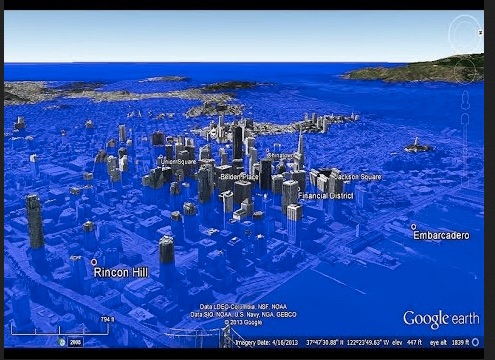Look at what happens as result of climate change in 10,000 years, based on decisions now being taken on climate policies
A recent study in the US reported that seas are rising at the fastest rate in the last 28 centuries (Gillis). That’s centuries, not years or decades. If emissions continue at the present level, many of those born today, and afterwards, will experience a sea level rise of 3 or 4 or 5 feet by 2100, with all the consequences of such a rise. In addition, recent calculations indicate that the carbon budget available to us is only half of what was previously estimated. So any commitments made in Paris to keep within a 2°C limit will now require half the level of diesel and petrol for cars, half the coal for power plants, and half the natural gas for central heating and cooking to reach that goal, assuming that goal is sufficient to protect us by 2100 (Radford).
But what happens after 2100, and does it matter. It does indeed.
David Roberts of Vox provides us some perspective based on a recent Comment submitted to Nature by a large group of scientists. The Comment argues that we are not paying enough attention to the longer span of time that will be affected by the carbon we continue to emit into the atmosphere. A considerable portion of our carbon, and our recent ancestors’ carbon, and the carbon we emit over the next 100 years, will stay in the atmosphere for tens to hundreds of thousands of years. Therefore, it is posited, to understand the consequences, we need to model the previous 20,000 years and the next 10,000 years.
And when they do, they report that the atmosphere will remain polluted with our carbon for 10,000 years; that over this century alone we will experience the warmest conditions ever recorded; that those conditions will continue, and worsen, over the next 10,000 years; and, that global mean sea level will rise to between 25 and 52 meters, or 82 and 170 feet.
Not many mega-cities built along seas will survive that level of sea rise level.
The Comment goes on to argue that “policy decisions made in the next few years to decades will have profound impacts on global climate, ecosystems and human societies — not just for this century, but for the next ten millennia and beyond.” The authors argue that these decisions require not just economic and scientific considerations, but also morality, including a human valuation of intergenerational equity. As they note, “What is clear from our analysis is that the decisions being made today will have profound and permanent consequences for future generations as well as for the planet; yet future generations are not part of today’s decision making, and today’s decision makers do not have to live with most consequences of their decisions.” If only the next 85 years is considered, critical information will not be provided to the public or political leaders in making decisions with impacts that will unfold over the next 10,000 years.
A second implication teased out in the report is that all carbon must be removed from the atmosphere, not just some: “If CO2 emissions continue unchecked, the CO2 released during this century will commit Earth and its residents to an entirely new climate regime.” As a result, we need policies that lead to a complete decarbonization of the world’s energy systems.
Bringing the discussion down to earth, Roberts then cleverly draws out the implications of this specter in light of the on-going presidential race in the US and in particular the dangers to Obama’s Clean Power Plan (CPP) if Donald Trump, or Ted Cruz or Marco Rubio, get elected with a Republican-controlled Senate. That scenario would likely spell doom for the CPP which would either be dismantled by a Republican President or rejected by a Supreme Court with a new conservative replacing the deceased Antonin Scalia.
Some have argued that the loss of Obama’s CPP might not be a fatal blow to the replacement of dirty fossil fuel by clean energy since renewables likely will win out, eventually, over fossils as a result of market forces, as renewable technology becomes cheaper and cleaner.
But Roberts points out that without a CPP, a Republican president may well support, indeed heavily subsidise, coal and fossil fuels, thereby undermining the transition to clean energy and allowing more and more carbon to be emitted with the consequences outlined in the Nature Comment. He also notes that the CPP was instrumental in bringing China and other reluctant parties on board the Paris talks, and a retreat from that commitment by the US could cut short any further global advances in the fight against the effects of global climate change. Paul Krugman of the The New York Times has recently weighed in with a position very similar to Roberts.
Should Trump get elected, and that is a frightening proposition, even to many leaders of the Republican party, it does not take much imagination to envision what havoc would ensue on the international stage, including a drastic retreat from any US climate change commitment. Roberts notes that the net result is that “This presidential election will have effects that will be felt by the next 100 generations of Americans.” I would add, and by the next 100 generations of people everywhere.
Assuming the reality of these science-based predictions, what do we make of them? We have had a hard enough time trying to convince people to take action to hold back the dire consequences that will be visited upon the earth by 2100. That seems a long time from now and our present difficulties in life often override such distant risks. We have had some luck in this struggle from the fact that many of those being born today and hereafter will be around in 2100 and therefore they are the children of people who are in a position now to act to protect their and other children. Also, we all are beginning to see the real, concrete consequences of climate change with the increase in numbers and intensity of extreme weather events.
It is getting harder to hide from the consequences of our actions or, more properly, our inactions.
Or so one would hope. Yet how do we convince people, alive now and in control of their fate, that the next several decades — their decades — will determine the fate of the planet for 10,000 years. The recent report in Nature is the start of that conversation.
In the meantime, we cannot depend on Trump’s response, or that of his followers. Or that of the current UK conservative leadership which backtracks on wind energy while it continues to subsidise fossil fuels, and forbids local governments from divesting from fossil fuels or from banning fracking. Or the regressive Australian government that has just announced that it is withdrawing support from one of the most critical research stations monitoring GHGs and their effects and converting the facility to focus more on research for commercial enterprises. This is of course only one of many regressive steps from the current Australian government.
If Hell is where it’s really hot, then Trump isn’t the only dangerous character out there on the political stage who would condemn us all to Hell, where we will be joined by all the generations to be born over the next 10,000 years.
Sources:
Peter U. Clark,. et al., “Consequences of twenty-first-century policy for multi-millennial climate and sea-level change,” Nature (8 Feb 2016). www.nature.com/articles/nclimate2923.epdf?referrer_access_token=uMj_w_rtu30xdZP5bPk6FdRgN0jAjWel9jnR3ZoTv0P7bBCydl3XkC-iEMeXdnEdD0CDGSUB4J_y6QudGd2kHI-O4zS0GBOo2PCuJDFGc2JdJs0LGIrWoStPg8lYReA9WPhvUOlXxg_lsLNTky-rTo92ASz0mwxFQ_o95G2H-Ea_yk5Lfy1yHkwiWZBYzNt0lW4jAVmZk85N6w8xX2BxskLdg69o-RsizFr_M_fKQ9ceFEfiy9HlYzdtIMe2u7Vilz0_gvE-b4pK_TSs0Tl2IKtGL0OfHL6xFLJ2l08votA%3D&tracking_referrer=www.washingtonpost.com&utm_source=hs_email&utm_medium=email&utm_content=26051679&_hsenc=p2ANqtz–EJ4K3UBfiYYNV0Nh-Ze2twfci7u6lJxPVE03XqiOJDmHatm0ZxJbkie4Am3ka3vXIPm8ThvRZaFtcPOtB5mCcscniCA&_hsmi=26051679
David Roberts, “The decisions we make about climate change today will reverberate for millennia. No pressure.”, Vox (15 Feb 2016). www.vox.com/2016/2/15/11004086/climate-change-millennia
Justin Gillis, “Seas are Rising at Fastest Rate in Last 28 Centuries,” The New York Times (22 Feb 2016). www.nytimes.com/2016/02/23/science/sea-level-rise-global-warming-climate-change.html
Tim Radford, “Fossil fuel use must fall twice as fast as thought to contain global warming – study,” The Guardian (25 Feb 2016). www.theguardian.com/environment/2016/feb/25/fossil-fuel-use-must-fall-twice-fast-thought-contain-global-warming
Michelle Innis, “Scientists Protest Cuts and Commercialization at Australian Climate Center,” The New York Times (28 Feb 2016). www.nytimes.com/2016/02/28/world/australia/cape-grim-climate-change-research.html
Paul Krugman, “Planet on the Ballot,” The New York Times (29 Feb 2016). www.nytimes.com/2016/02/29/opinion/planet-on-the-ballot.html




No comments yet, add your own below